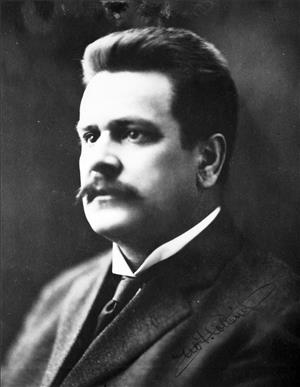On July 19, 1913, Mayor George Cotterill, responding to street riots the previous evening during the Potlatch Days festival, declares an emergency, assumes direct control of the police, closes saloons, bans street speakers, and attempts to temporarily close down The Seattle Times, which he believes provoked the riots. The mayor says the paper may publish if he can review the copy to see that it is not inflammatory. Publisher Alden Blethen refuses and goes to court, where a judge overturns the mayor's order.
Mayor Tries to Close or Censor Newspaper
After the order was delivered to Blethen in his second floor office at 2nd Avenue and Union Street, Seattle police were stationed at the Times building and prevented distribution of an "extra" to news boys. Blethen, enraged at the order, reportedly vented on the police officers and tried to give a speech to a crowd that had gathered outside the building.
Just after noon, Judge John E. Humphries issued a restraining order barring the closure of the newspaper. At the request of Seattle Times lawyers, the judge also issued contempt of court warrants for Cotterill and Chief of Police Claude Bannick.
Newspaper Opposes Free Speech on Streets
The Times article of that day accused Cotterill of "trying to the shift the blame" for the rioting onto the shoulders of the newspaper, alleging that the mayor was responsible for allowing "anarchist" speakers on the streets. The next day's banner headline, riding over an enormous American Flag, went even further: "Mayor Cotterill Names Himself King: But Is Promptly Deposed by State Courts!" The first sentence of the article read: "George F. Cotterill has again demonstrated his unfitness to be mayor of Seattle!"
The chain of events leading up to the riots and Cotterill's actions began two days before, on July 17, 1913, when five servicemen confronted an Industrial Workers of the World (IWW) street speaker and came into conflict with the crowd gathered around her. The police dispersed the crowd, rescuing the servicemen with only minor injuries.
The incident was played up by the Times in conjunction with a patriotic speech given by Secretary of the Navy Josephus Daniels in the nearby Rainier Club. The Times used the article to criticize Mayor Cotterill for his open policy toward street speakers and to attack the IWW and Socialists. The following night, during the continuing Potlatch festivities, soldiers, sailors, and citizens sacked IWW and Socialist headquarters and set fires of literature and furnishings in the street.
The Potlatch Days festival ended more peaceably on July 19, 1913.

